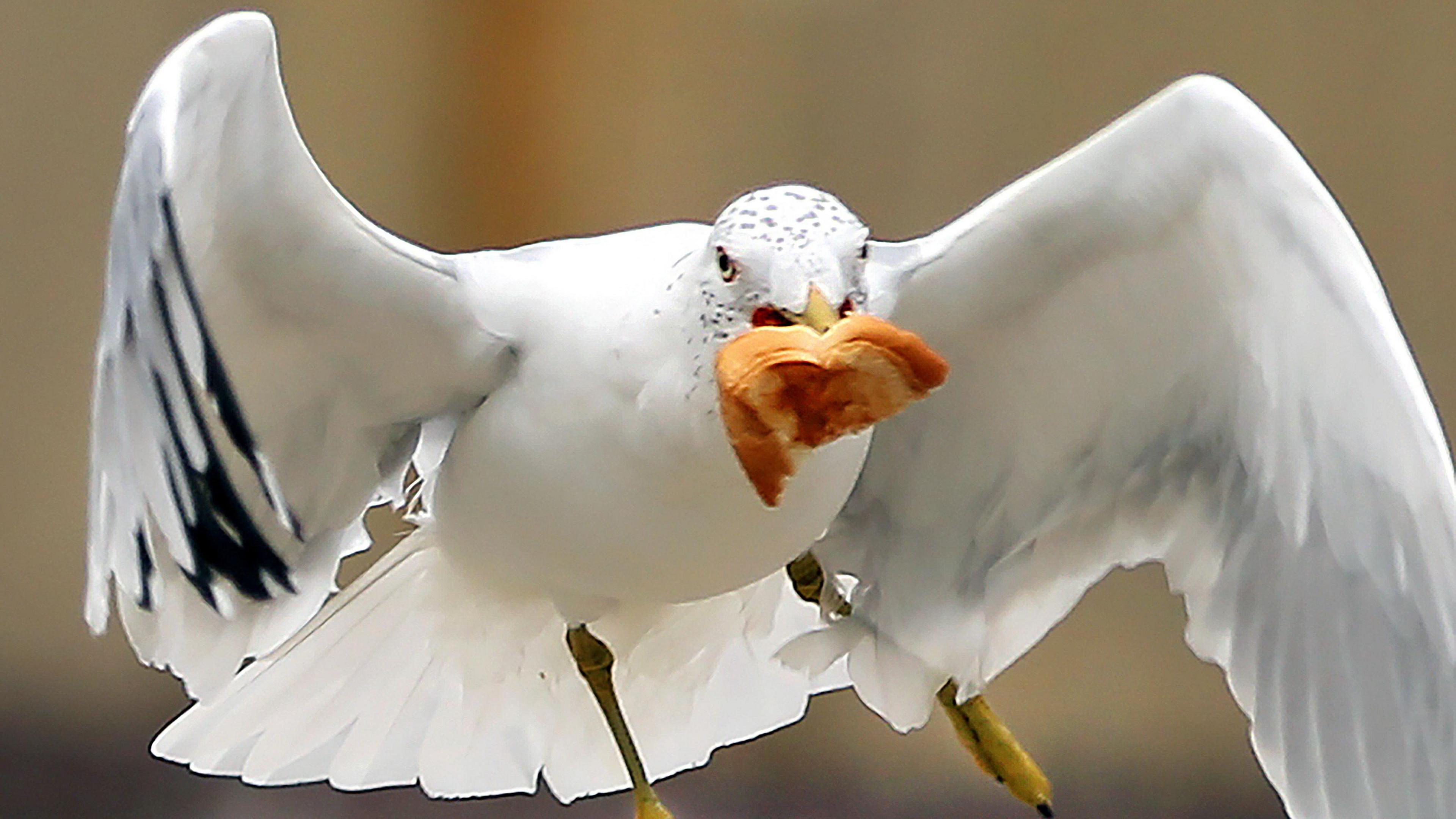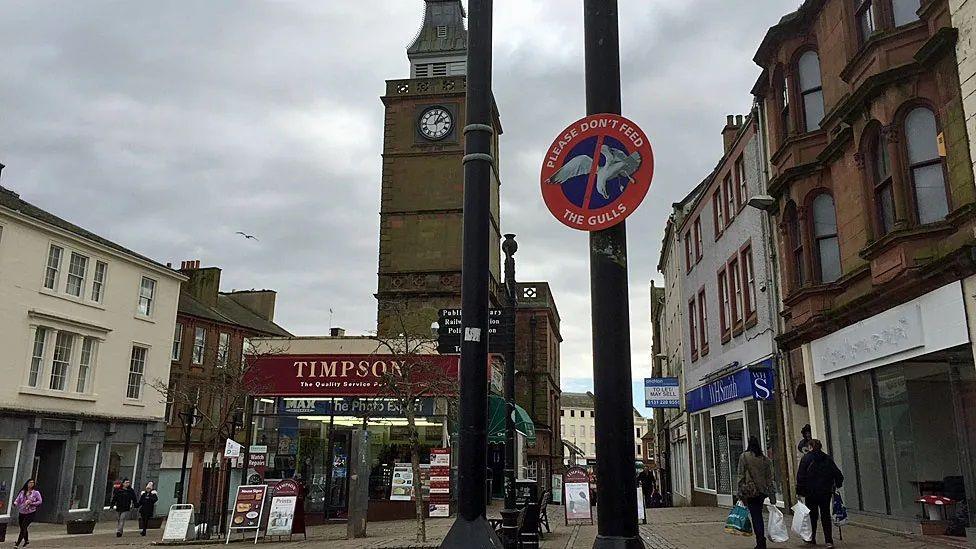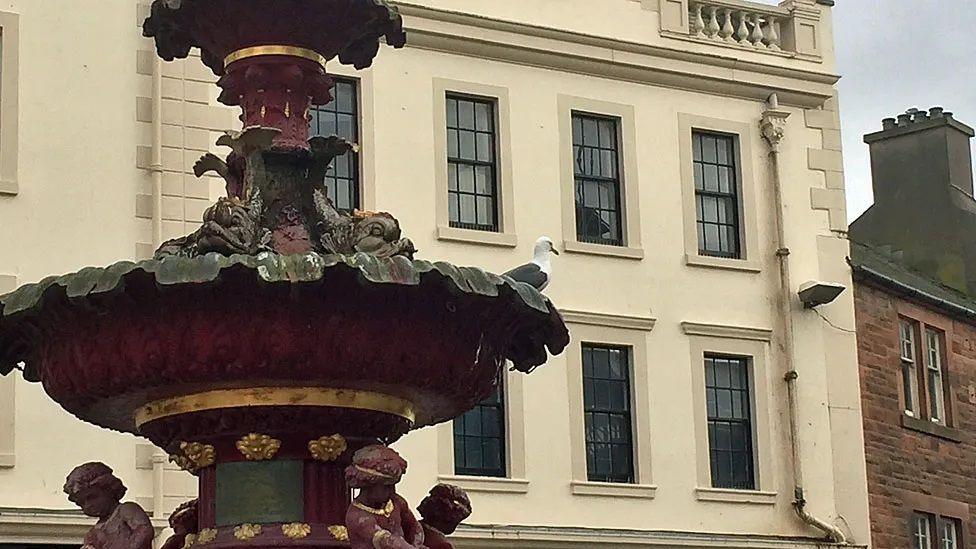Council's £84k anti-seagull measures to continue

The problem of seagulls "dive-bombing" to snatch people's food has been a long-running concern
- Published
Anti-seagull measures in south-west Scotland are to continue, after a meeting heard the birds' population is in decline.
Dumfries and Galloway Council (DGC) has spent tens of thousands of pounds to combat the issue of "dive-bombing" birds scavenging food during their breeding season.
The authority is planning to conduct its first seagull headcount in four years to assess the success of its "gull management strategy".
Since the measures were introduced two years ago, complaints about the birds have dropped by more than 75%.

Dumfries hosted a national summit on the urban gull problem more than a decade ago
The region, including its main towns of Dumfries, Stranraer and Annan, has long-standing issues with the urban gulls swooping and taking food, as well as noise and mess problems.
Councillors have voted for the action plan - which includes egg and nest removal, and installing spikes on roofs - to continue for a third year.
DGC's communities committee on Tuesday highlighted that the local authority spent all of its allocated £84k on the issue across 2023-4.
It has put aside the same amount again for 2024-5, with the hope it is reducing the number of attacks on both residents and visitors.
Complaints about the birds have fallen from 158 in 2021-22, to 96 across 2022-23, and 39 during 2023-24.
Concern for the gulls
But with NatureScot reporting that avian flu has seen seagull numbers decline nationwide, it is not fully clear how successful DGC's efforts have been.
And despite Tuesday's vote, some councillors expressed concern about gulls and the welfare of chicks.
Independent member David Slater questioned whether those removing nests were trained and worries that "when eggs are taken away, they are actually throwing away live chicks".
He said: "How do they know how long the eggs have been incubated? It takes 28 days to hatch a seagull egg, and in the last week they are fully formed and whistling to each other.
“There’s other methods that could be used, it’s a disgrace in this day and age.”
Ben Dashper, of the SNP, feels "there needs to be some sort of narrative around protection as well".

The number of pairs of gulls nesting in Dumfries has fallen
DGC's community protection manager, Sandra Harkness, said its programme was "gull management, and not just eradication", and that no chicks had been removed.
She said: "It’s about managing the population so they can live with residents, and not cause the level of distress they have been doing."
While it is illegal to harm seagulls or remove their nests, an application can be made through NatureScot for a licence to remove nests and eggs.
DGC had 37 licences for egg and nest removal granted by Nature Scot, with a permitted 660 eggs and 326 nests removed during 2023-24.
The action plan has seen 36 public buildings "gull-proofed" by contractors, who use spikes and other means to limit nesting opportunities.
Follow the BBC for the South of Scotland on X, external.
Listen to news for Dumfries and Galloway on BBC Sounds.
Dive-bombing gull fight success detailed
- Published14 March 2018
Rallying cry issued in seagull struggle
- Published5 June 2019
New battle plan in fight to control urban gulls
- Published30 January 2022
How do you solve a problem like the seagulls?
- Published16 September 2019
Fighting on the urban gull frontline
- Published28 June 2016
Get in touch
What stories would you like BBC News to cover from the south of Scotland?